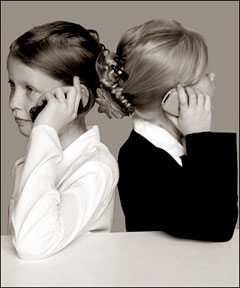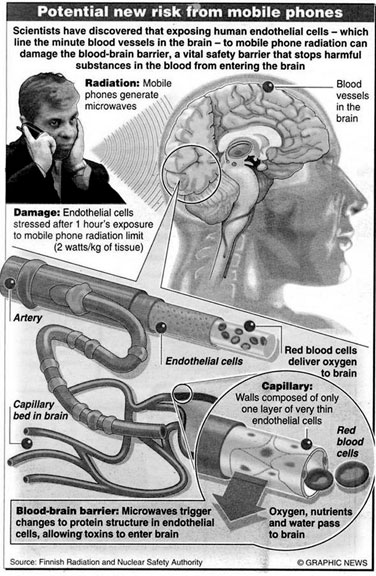
Keep your calls short
Sumanasiri
is a traditional coconut plucker. Not trained to do any other job, he
has been plucking coconuts for his survival for a long time. Last week
he undertook the contract of plucking coconuts in the adjoining land.
While he worked he stopped now and then for a chat.
Happy to notice, the most luxurious items of the by gone era, have
now reached the doorsteps of the poor too. The device which he was using
is not an asset of the rich any more. Imagine... Sumanasiri was taking
'orders' from his customers from the top of a coconut tree, which is
over 40 feet. He has a special pouch for his handy mobile phone too.
 But with advances, the small handy device - the mobile phone - is now
more or less a mini computer. It has become one of the 'most wanted
gagematics' of the present generation. But with advances, the small handy device - the mobile phone - is now
more or less a mini computer. It has become one of the 'most wanted
gagematics' of the present generation.
However, this handy device has scared many of its customers. While
man-made electromagnetic devices are fast growing adding latest
technology and among all other devices, the one most subjected to
research and discussion is the mobile phone.
Time to time media reports warning of possible cancer growth when
using the handy device unlimitedly, have alarmed the mobile users. The
radiation levels of the mobile phones are low and it is a device, that
transmits, micro wave radiation. The fear of exposing to cancer through
mobile phone is still a highly debated issue among scientists not only
in Sri Lanka but all over the world.
While there are dozens of scientific researches that prove and
disprove the phenomena, the Sri Lankan health experts on cancer and ENT
sounding the same view said that there was no concrete evidences to show
that brain and other cancers had any relation to mobile phones.
 But Consultant Oncologist of the Maharagama Cancer Hospital, Dr.
Jayantha Balawardena said that there is a marked increase in brain
cancer among young people in Sri Lanka. "Lots of young people are
suffering with brain tumours. But the cause of this marked increase is
yet a grey area which needs to be scientifically proved", he said. But Consultant Oncologist of the Maharagama Cancer Hospital, Dr.
Jayantha Balawardena said that there is a marked increase in brain
cancer among young people in Sri Lanka. "Lots of young people are
suffering with brain tumours. But the cause of this marked increase is
yet a grey area which needs to be scientifically proved", he said.
According to Dr. Balawardena, the patients are in the age of 30 to
40. "I can not exactly contribute this increase to the mobile phones but
what I can say is the number of young people with brain cancers are
increasing", he said. He said that the issue of cancer and mobile phones
are not proved yet and the researchers who engage in this research hold
two different believes but nothing has been proved so far.
"Mobile phones are using radio active waves and these devices send
Electro Magnet Radiation (EMR) which is similar to the EMR which is used
to treat cancers. But the mobile have very low EMR", he said. Dr.
Balawardena said that there was a possibility for a health hazard when
using the mobile phone for a long period of time but that was not
scientifically proven. As evidences are conflicting he said that as a
cancer specialist he could advise to consider if there was a safer side.
"It is always better to avoid possible risks", he said. He advised to
limit the number of calls and the duration of the conversation and use
the available devices to avoid direct exposure to radiation. "Keeping
the mobile phone away from the ear is also very much important to
minimize the radiation exposure", he said.
Meanwhile, the Consultant ENT Surgeon, Dr. W. Ratnayake said that
some patients come for treatment for pain in the ear after using the
mobile phones. But he said that there was no connection between the
mobile phones and these complaints as it was not proven yet.
With yet an unclear picture of the health implications of the mobile
phones some scientists link headaches, cancer and memory loss to mobile
phones.
A research done by Dr. Mortzavi of the Rafsanjan University of
Medical Sciences, Iran on prevalence of ill-health associated with
exposure to electromagnetic fields (EMF) among university students have
revealed that there is a rapid increase in the number of students
complaining about various symptoms that may be linked with exposure to
electromagnetic fields (EMF), during past years.
The students used both mobile phones and video display terminals
frequently and the research carried among University students found that
there was no link to mobile phone use and significantly higher
prevalence of self-reported symptoms was found in individuals who had
used mobile phones, video display terminals or cordless phones more
frequently than others.
A UK government funded study which emphasized the need of more
indepth study on the issue revealed that there was no direct evidence of
a health risk from using mobiles.
However, the international researchers warning the mobile users who
talk more than 30 minutes have said that there were scientific evidences
of possible health risks.
Dr. Roger Coghill, a specialist in bio-electromagnetic who had done a
survey using 500 mobile phone users had shown that around 40 percent of
the users have headaches. Those who have long chatting had complaint of
thumping headache. "After a while users feel extremely tired, and their
reaction times start to fall off. After 14 months to two years some
users will start to develop leukaemia", he has told to the BBC.
"My laboratory has carried out research which shows that after a
seven-and-a-half hour exposure to a mobile phone on stand-by there was a
serious degradation of the white blood cells (the cells that fight
disease).
A day after exposure there was a substantial fall in the viability of
white blood cells, and after the second day only 13% of white blood
cells were viable".
According to Coghill, it is simple to minimize the health risks
associated with the mobile phones. "If somebody touches a mobile phone
to their head radiation is conducted directly into the head. Keeping the
phone a couple of centimetres away from the head reduces the exposure to
radiation by orders of magnitude. Protective pouches also help to reduce
exposure to radiation, but earpieces are enormously adverse, because
they conduct radiation directly to the head", he said.
His latest research suggests the microwaves generated by mobile
phones may damage the ability of white blood cells to act as the
"policemen" of the body, fighting off infection and disease.
He claimed that the body's immune system is partially controlled by
electromagnetic fields emitted by the body. He believes the radiation
emitted by mobile phones damages the body's own electromagnetic fields,
and undermines the proper functioning of the immune system.
However, Coghill has launched a legal test case against a mobile
phone shop for allegedly failing to warn customers of the potential risk
of radiation.
Meanwhile, Professor Colin Blakemore, of the Oxford University and a
member of the official body that regulates the use of mobile phones in
the UK had decided to limit his use of mobile phone saying that there
was growing evidence to show that mobile phones could affect the
functioning of the brain. Prof. Blakemore had told the BBC News On-line
that nerve cells were influenced by electromagnetic radiation similar to
the type of radiation produced by mobile phones and when the phones were
also placed close to areas in the brain that regulated short-term
memory, as well as areas that controlled heart function and blood
pressure.
But according to Prof. Blakemore the effect of mobile phones was
likely only to be temporary, and relatively small. He said reports that
suggested mobile phones could cause permanent damage should be treated
with great caution.
Another international research comprised team of electronics expert
has claimed that some people who use mobile phones heavily have started
to develop cancer.
Researcher Alisdair Phillips, a member said that he had received
frequent complaints from regular phone users about headaches, loss of
concentration, skin aching or burning and twitching.
"The complaints can involve eye tics, short-term memory, buzzing in
the head at night and other effects such as tiredness. This is the first
time in human existence that people have wandered around with radiating
devices held close to their bodies. We have got numbers of people that
are now unable to work who have been using mobile phones up to seven or
eight hours a day. These are the heavy users of mobile phones. It is too
early to say, but we are starting to see lymphomas of the neck in heavy
phone users", he said adding that it has been repeatedly shown that a
few minutes exposure to cell phone type radiation can transform a 5
percent active cancer into a 95 percent active cancer for the duration
of the exposure and for a short time afterwards."
While the possible health risks of using mobile phones are
scientifically endorsed yet in indept researches, the mobile users need
to be survival. The best weapon against is taking precautions. According
to scientists, the earpiece is the only saviour. Source: BBC Online
However,
you can reduce your exposure from your mobile phone by
following these suggestions:
Use your phone as little as
possible, and only when you have no alternative - send a
text or use a land line instead.
Keep your calls short.
Try to avoid using your
phone if the signal strength is low - find a better location
to make a call (for example, outdoors or nearer a window) if
it improves the signal.
Consider using a hands-free
set, to increase the distance between your head and the
phone, or try not to hold your hand-held phone too close to
your head.
Finally, remember that
using a mobile phone (hands free or hand-held) while driving
reduces your responsiveness, whether you are pregnant or
not. This means that you are at an increased risk of having
an accident if you take or make a call while you are driving
your car.
|
Is it safe to use a mobile phone during pregnancy?
The short answer to this question is that mobile phones are probably
safe to use in pregnancy. Research suggests that there is no risk to
health from mobile phones in the short term.
However, it is still a good idea to be cautious. Mobile phones have
only been in use for a relatively short amount of time, so it's
impossible to be certain of their long-term effects yet.
Mobiles emit low levels of "non-ionising" electromagnetic radiation -
as do televisions, computers, microwave ovens and other man-made and
natural environmental sources that were exposed to every day. "Non-ionising"
radiation is much milder than the "ionising" radiation emitted by
sources such as x-rays, radiation therapy machines and CT scans, which
are known to be harmful to a developing baby.
Every mobile phone is rated according to the levels of
electromagnetic radiation (radio waves) that it emits. This SAR
(specific absorption rate) value reflects the maximum amount of energy
absorbed by your body when you are using the phone. The higher your
phone's SAR, the more radiation you will absorb. You can check your
mobile phone's SAR rating.
In the EU has adopted the recommendations made by the International
Commission on Non-Ionising Radiation Protection. These recommend an SAR
limit of 2W/kg (watts per kilogram). All mobile phones on sale in the UK
and the rest of Europe comply with this limit. However, standards vary
around the world. For example, in the USA the limit is set slightly
lower than Europe, at 1.6W/kg.
In practice, the amount of energy emitted by your phone depends on
how strong the signal is. The more powerful the signal, the less energy
the phone needs to communicate and so the SAR is also reduced in
proportion.
So only using your phone when you have a strong signal is one way to
reduce the level of radiation you are exposed to. Using a hands-free kit
can reduce the SAR for your head while you are on the phone but may
increase the SAR for the rest of your body, something you might want to
avoid while you are pregnant.
Experts from around the world agree that non-ionising radiation is
unlikely to harm a developing baby, because it is at the low end of the
electromagnetic spectrum.
www.babycenter.com |
